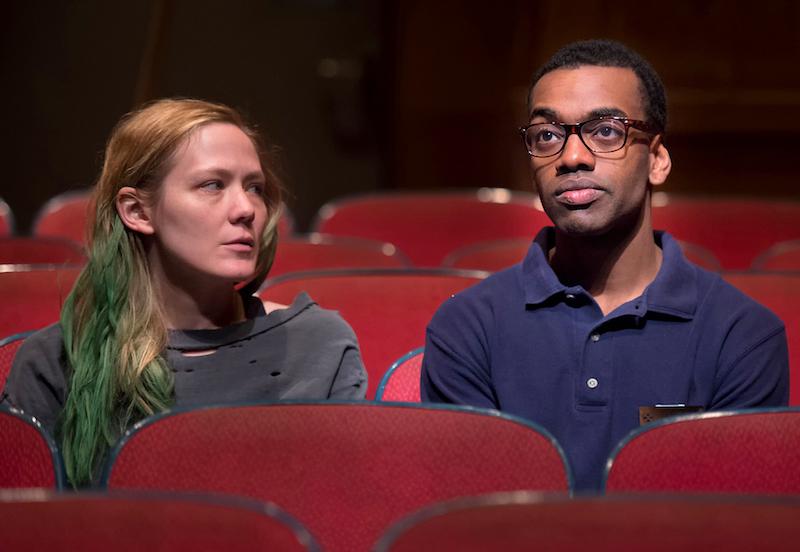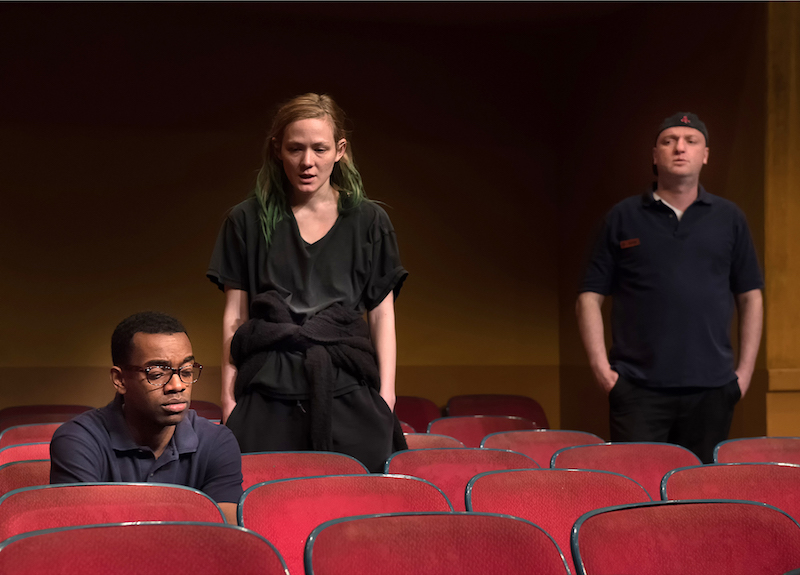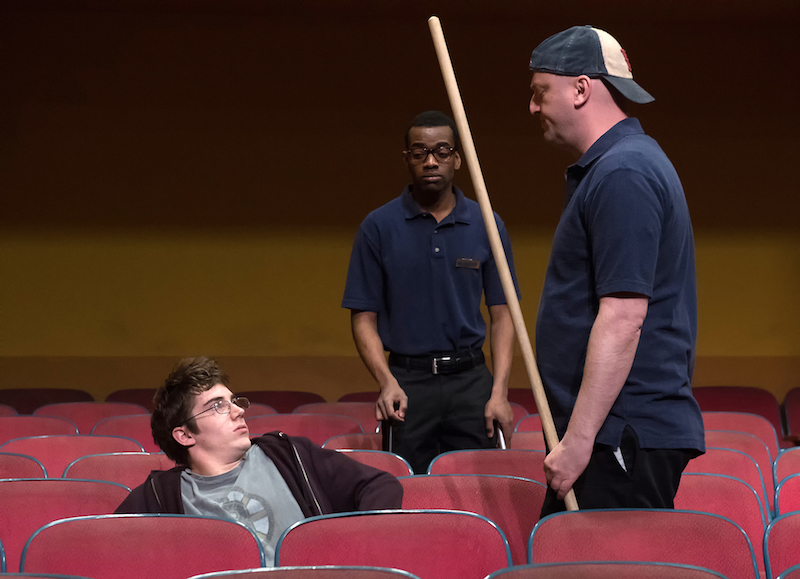The Flick, National Theatre | reviews, news & interviews
The Flick, National Theatre
The Flick, National Theatre
Annie Baker makes the ordinary extraordinary

A Pulitzer Prize and numerous walkouts: The Flick, infamously, courts extreme reactions. Yet this latest American import is dedicated to minutiae. In Annie Baker’s slow-burning (three hours-plus), microscopic epic, her lens is trained on ordinary people, mundane tasks, arid pauses and inarticulate speech that trails… off.
Though this may initially seem like indulgent anti-drama, the brilliance of Baker’s strategy soon becomes clear. We become so attuned to life in the rundown movie theatre in Worcester County, Massachusetts that the smallest alteration feels like a seismic shift. The developing rhythm of veteran employee Sam (Matthew Maher) and new boy Avery (Jaygann Ayeh) is violently disrupted by the appearance of projectionist Rose (Louisa Krause, pictured below with Ayeh and Maher), just as we’ve become accustomed to their methodical – real-time – sweeping up of spilled popcorn, up and down each row of faded velour seats. Frequent Baker collaborator Sam Gold’s production is so measured and unblinking that you almost expect an Attenborough wildlife voiceover to kick in. This level of naturalism is key to Baker’s exploration of the gulf between performance and authenticity, fantasy and reality. Not just between grand Hollywood blockbusters and the unglamorous existence of small-town, low-paid workers, but the difficulty of separating who we are and what we feel from projections and expectations. Sam’s unrequited passion for Rose is exquisitely poignant, but does he really love her or the idea of her? The disillusioned millennial trio, all still living with their parents, keep reaching for “normality” – those friendships, relationships, careers and aspirations enshrined in popular culture – and keep falling short.
This level of naturalism is key to Baker’s exploration of the gulf between performance and authenticity, fantasy and reality. Not just between grand Hollywood blockbusters and the unglamorous existence of small-town, low-paid workers, but the difficulty of separating who we are and what we feel from projections and expectations. Sam’s unrequited passion for Rose is exquisitely poignant, but does he really love her or the idea of her? The disillusioned millennial trio, all still living with their parents, keep reaching for “normality” – those friendships, relationships, careers and aspirations enshrined in popular culture – and keep falling short.
All of which flickers around the edges of the warmly comic and the humdrum. Rather than sweeping plot arcs, Baker gives us tiny occurrences: the finding of a lost shoe, a sleeping customer, a missing ceiling tile, an abandoned tapioca pudding. Sometimes the long silences contain multitudes – Sam exerting his “de facto” authority over Avery, romantic longing stretching endlessly – and sometimes they’re just dead time. Sam hopes a meandering anecdote about tamales will lead to a profound realisation, but meaning slips out of his grasp. Connection ebbs and flows between these alienated souls, who have been consigned to redundancy along with their theatre’s 35mm projector, soon to fall victim to digital (the play is set in 2012).
Baker waxes lyrical about the relative texture, engagement and expressiveness of film – the clinical sheen of digital is like “looking at a postcard of the Mona Lisa” – and her writing bears comparison, building something tangibly real from impeccably observed fragments and nuances. It’s the theatrical equivalent of Buddhist sand mandala, painstakingly constructed and painfully ephemeral. When the picture becomes clear, in a devastating denouement, it’s well worth the wait.
 Original cast member Maher (pictured right with Sam Heron and Jaygann Ayeh) methodically strips away the defences of seemingly implacable, thirtysomething Sam, who is living a life of quiet desperation. Each new thwarted hope beats him down a little further, until he snaps in memorable fashion, deploying both popcorn and passive aggressive mop-wringing. But Gold also encourages us to zoom in on minute reactions: Maher’s incredulousness when 20-year-old Avery blithely asks “What do you wanna be when you grow up?”, or closing his eyes in pain as his rival falters his way towards a date.
Original cast member Maher (pictured right with Sam Heron and Jaygann Ayeh) methodically strips away the defences of seemingly implacable, thirtysomething Sam, who is living a life of quiet desperation. Each new thwarted hope beats him down a little further, until he snaps in memorable fashion, deploying both popcorn and passive aggressive mop-wringing. But Gold also encourages us to zoom in on minute reactions: Maher’s incredulousness when 20-year-old Avery blithely asks “What do you wanna be when you grow up?”, or closing his eyes in pain as his rival falters his way towards a date.
Krause, also in the original cast, reveals the scrappy need beneath Rose’s aggressive independence and bored snark – a convulsive would-be seduction is horrifyingly cringe-worthy – while recent RADA graduate Ayeh conveys the tragedy of savant cinephile Avery’s brilliance with movie recall versus his emotional incoherence. There’s power, too, in his questioning of his fellow employees’ moral laxity – they regularly skim money off the box office – and grim knowledge that, as “the black kid”, he’s more likely to get the blame. Baker is also sensitive to economic disparity: though they’re all stuck in a menial job, Avery’s college professor dad offers him a way out.
“People always freak out when like, you know, when like art forms move forward,” says Sam, and though there are flaws in this studied approach – a protracted phone call to a therapist, an overuse of the symbolic, sound-muffling projection booth glass – this is an original and richly empathetic work. Baker points the projector at the audience, making us the movie screen, but by turning our gaze to those on the other side of it, we are immersed in the dreams and heartbreak of small, unsung lives. Avery fears they can’t escape the postmodern insincerity born of mass media infiltration, but Baker succeeds in locating an achingly pure humanity.
rating
Share this article
The future of Arts Journalism
You can stop theartsdesk.com closing!
We urgently need financing to survive. Our fundraising drive has thus far raised £49,000 but we need to reach £100,000 or we will be forced to close. Please contribute here: https://gofund.me/c3f6033d
And if you can forward this information to anyone who might assist, we’d be grateful.

Subscribe to theartsdesk.com
Thank you for continuing to read our work on theartsdesk.com. For unlimited access to every article in its entirety, including our archive of more than 15,000 pieces, we're asking for £5 per month or £40 per year. We feel it's a very good deal, and hope you do too.
To take a subscription now simply click here.
And if you're looking for that extra gift for a friend or family member, why not treat them to a theartsdesk.com gift subscription?
more Theatre
 Troilus and Cressida, Globe Theatre review - a 'problem play' with added problems
Raucous and carnivalesque, but also ugly and incomprehensible
Troilus and Cressida, Globe Theatre review - a 'problem play' with added problems
Raucous and carnivalesque, but also ugly and incomprehensible
 Clarkston, Trafalgar Theatre review - two lads on a road to nowhere
Netflix star, Joe Locke, is the selling point of a production that needs one
Clarkston, Trafalgar Theatre review - two lads on a road to nowhere
Netflix star, Joe Locke, is the selling point of a production that needs one
 Ghost Stories, Peacock Theatre review - spirited staging but short on scares
Impressive spectacle saves an ageing show in an unsuitable venue
Ghost Stories, Peacock Theatre review - spirited staging but short on scares
Impressive spectacle saves an ageing show in an unsuitable venue
 Hamlet, National Theatre review - turning tragedy to comedy is no joke
Hiran Abeyeskera’s childlike prince falls flat in a mixed production
Hamlet, National Theatre review - turning tragedy to comedy is no joke
Hiran Abeyeskera’s childlike prince falls flat in a mixed production
 Rohtko, Barbican review - postmodern meditation on fake and authentic art is less than the sum of its parts
Łukasz Twarkowski's production dazzles without illuminating
Rohtko, Barbican review - postmodern meditation on fake and authentic art is less than the sum of its parts
Łukasz Twarkowski's production dazzles without illuminating
 Lee, Park Theatre review - Lee Krasner looks back on her life as an artist
Informative and interesting, the play's format limits its potential
Lee, Park Theatre review - Lee Krasner looks back on her life as an artist
Informative and interesting, the play's format limits its potential
 Measure for Measure, RSC, Stratford review - 'problem play' has no problem with relevance
Shakespeare, in this adaptation, is at his most perceptive
Measure for Measure, RSC, Stratford review - 'problem play' has no problem with relevance
Shakespeare, in this adaptation, is at his most perceptive
 The Importance of Being Earnest, Noël Coward Theatre review - dazzling and delightful queer fest
West End transfer of National Theatre hit stars Stephen Fry and Olly Alexander
The Importance of Being Earnest, Noël Coward Theatre review - dazzling and delightful queer fest
West End transfer of National Theatre hit stars Stephen Fry and Olly Alexander
 Get Down Tonight, Charing Cross Theatre review - glitz and hits from the 70s
If you love the songs of KC and the Sunshine Band, Please Do Go!
Get Down Tonight, Charing Cross Theatre review - glitz and hits from the 70s
If you love the songs of KC and the Sunshine Band, Please Do Go!
 Punch, Apollo Theatre review - powerful play about the strength of redemption
James Graham's play transfixes the audience at every stage
Punch, Apollo Theatre review - powerful play about the strength of redemption
James Graham's play transfixes the audience at every stage
 The Billionaire Inside Your Head, Hampstead Theatre review - a map of a man with OCD
Will Lord's promising debut burdens a fine cast with too much dialogue
The Billionaire Inside Your Head, Hampstead Theatre review - a map of a man with OCD
Will Lord's promising debut burdens a fine cast with too much dialogue

Add comment